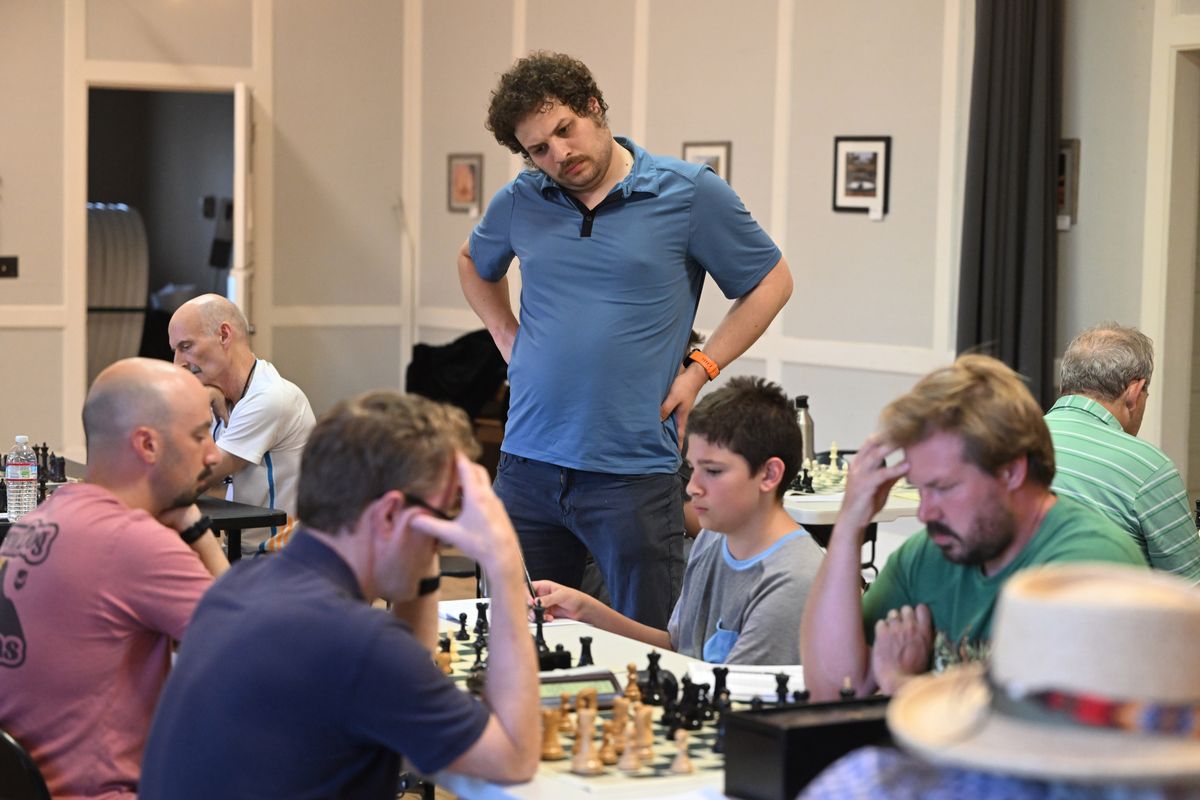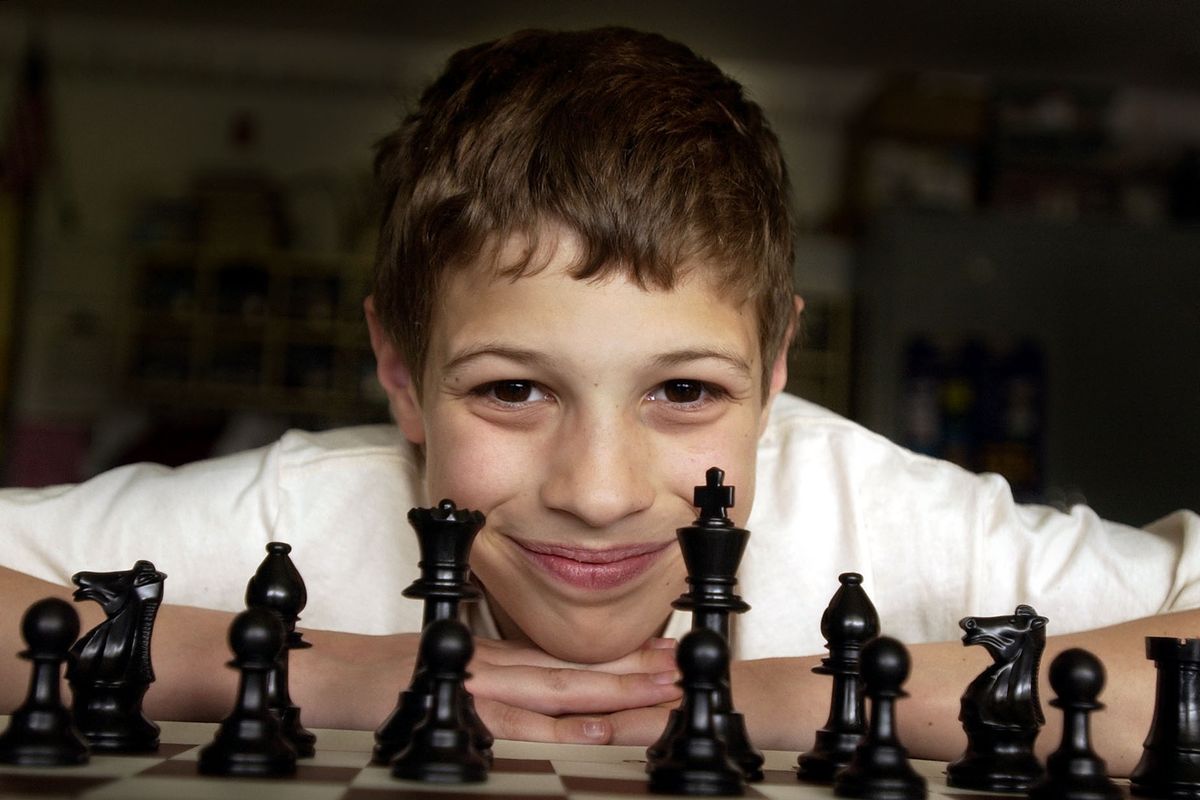Meet Spokane’s ‘chess king’ and the other players who travel from across Eastern Washington for the love of their game
Michael Cambareri, standing, watches the other games going on July 18 at a meeting of the Spokane Chess Club at the West Central Abbey in Spokane. Cambareri is president of the club and its highest-rated player. (JESSE TINSLEY/THE SPOKESMAN-REVIEW)
For many, chess can be a complicated, mind-boggling game – not worth the effort it would take to master its 64 squares and 32 pieces. But for player Michael Cambareri, the complexity is exactly what he loves .
“There’s not much that’s the same between two (chess) games… because there are so many different combinations,” Cambareri said.
Cambareri plays at the Spokane Chess Club, which meets at 7 p.m. on Thursday at the West Central Abbey’s fellowship hall.
As the highest-rated player and club president, Cambareri is hailed as the chess “king.”
When Cambareri began playing chess, for him, it was just “one of those board games.” But it’s become so much more.
His family always loved to play board games, but chess just really stuck.
“My brother and I played a little bit, but I was definitely better than him, and we’re very competitive, so it was kind of disheartening for him.”
After beating his brother, he started playing in small tournaments in his hometown, Boise. In first grade, he won the Idaho state elementary tournament, which was the second tournament he ever played in. In fifth grade, he won the national elementary school championship. Then, in sixth grade, he won the junior high nationals, which he considers to be his greatest accomplishment.
He went on to compete in a youth chess olympiad in Malaysia, as a representative of the U.S.
The training and studying necessary to compete at the national level were taxing on young Cambareri, and he began to feel burned out.
He took some time off from chess in high school to focus on his other interests, like politics and math competitions.
“After taking a little break from chess in high school, I kind of got to a point where I was having fun with chess again,” Cambareri said.
Now, with a rating over 2000, Cambareri has reached the title of chess “expert.”
Chess players are ranked based on what’s called an Elo rating system. Players gain Elo for a win and lose it for a loss. A higher-rated player will gain less for beating a lower-rated player, and vice-versa. The amount of Elo gained or lost by one player is equally reflected in the loss of another.
The International Chess Federation ranks players based on this system. Players are awarded titles for reaching a high enough Elo. The grandmaster title, for example, is rewarded for reaching a FIDE rating of 2500 or higher, and receiving three grandmaster “norms.” Grandmaster norms can only be obtained in tournaments where a minimum of three grandmaster players players from different countries play at or over 120 minutes.
Cambareri hopes to achieve a master rating, but acknowledges that becoming a grandmaster would be a big stretch.
“I’d like to be a master someday. And I think that’s a very achievable goal. That … would probably require putting a little more effort into it, but I think it’s, you know, a place I can get,” he said.
Cambareri works in Newport at the Utilities District for Pend Oreille County. He maps where their powerlines and other things of that nature are placed.
“I’m their map guru,” Cambareri said.
He uses the skills he’s developed through chess to help him with his job.
“I like spatial things, and maps kind of work well with things like that,” Cambareri said.
The Spokane Chess Club is not just the chess hub of Spokane, but all of Eastern Washington. Like Cambareri, players will travel for miles from places like Chewelah and Moscow to come play the game they love in a small sweltering room, full of the people they love.
“I mean, I’m, you know, a fairly antisocial person in general,” Cambareri said. “This is like my big outlet of the week.”
While Cambareri may be hailed as the king of the club, he is not without his competitors.
Club member Cameron Leslie has been playing chess for 31 years. He started in school and really enjoyed it. He has a rating not as high as Cambareri’s, but still slightly over 2000, which makes him another chess “expert.” Leslie jokingly refers to Cambareri as his “arch-nemesis.”
“On a personal level, I really like Michael a lot. I think he’s a very nice guy, but he’s the other expert in the club, and so there’s a natural rivalry between us,” Leslie said.
Leslie views the competition as a good thing.
“I would say that if you come to a chess club, people at the chess club are naturally going to know more about chess than you do, probably. And so there will be a growing pain. You know, just like with anything, like if you show up at the karate club, you’re gonna get smacked around,” he said. “And I think that happens here. And I think that maybe we’re not so good about, you know, putting on the kid gloves. But if you persist, you get better. So, I find that competition fun, and it’s something I look forward to.”
“I find that Michael pushes me in ways other people can’t here at the club,” Leslie added. “He’s very aggressive. He likes to burn bridges before he crosses over them. And he always plays for the initiative.”
The chess club is also home to promising up-and-coming chess players such as 17-year-old Ben Patterson of Chewelah, who won the 9th through 12th grade section at the state tournament. He also recently won a blitz tournament at the club.
Patterson has been coming to the chess club for around four years. His dad taught him how to play when he was 4, and he used to play a half-hour chess game with his older brother almost every day until he started to play competitively in sixth grade. He currently has a rating of about 1800 and hopes to become a master someday.
He plays online too, but he thinks there is “something about the physical pieces, playing over the board and actually meeting people,” that brings him to the weekly chess club.
“We’re a group of people in a relatively large city who have this hobby that not a lot of people have, and we kind of bond over it, I guess,” Patterson said.
Anyone is welcome to join the club for casual play, which is free. It is $24 for an adult membership, and there are some additional costs for tournament entry.
The first chess club in Spokane, the “Spokane Chess and Checkers Club,” was formed on Jan. 3, 1899.
Kevin Korsmo, the treasurer of today’s club, has been playing with them for 34 years. He’d played chess since the ’60s but really got into it in the ’70s when he used to read about the legendary matches between Boris Spassky and Bobby Fischer in the newspapers.
Rated at 1600, with a peak rating of about 1830, Korsmo describes himself as “an old man whose game was slept in decades ago.”
“I just encourage people to give it a try,” he said. “And if necessary, take some time off and come back and give it another try.”
Teen Journalism Institute intern reporter Troy Slack contributed to this article.

